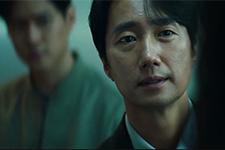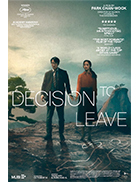Decision to Leave (Heojil kyolshim)
|  Fans of Park Chan-wook’s more graphic and outré films—Sympathy for Mr. Vengeance (2002), Oldboy (2003), The Handmaiden (2016), to name a few—will likely be disappointed by the more restrained, classical approach he takes to romantic obsession in his newest film, Decision to Leave (Heojil kyolshim), for which he won the Best Director award at the Cannes Film Festival from a jury that included directors Asghar Farhadi and Jeff Nichols, both of whom traffic heavily in suspenseful understatement. There is no graphic sex, no splattering blood, no shrieking confrontations. There are a number of dead bodies, but the violence that creates them is largely left off-screen. What we do get on screen is a lot of heat, passion, and twisted desires, and the manner in which Park harnesses it all is what makes the film so absorbing. The film’s protagonist is Jang Hae-joon (Park Hae-il), a police detective who becomes obsessed with Song Seo-rae (Tang Wei), the much younger wife of an older man who is found dead at the base of a small mountain. Jang and his younger and more energetic partner, Soo-wan (Go Kyung-pyo), investigate the death, and they have reason to suspect Seo-rae’s involvement, partially because she seems so unmoved by her husband’s death and partially because she had motive since it is determined that he abused her. At this point, the film leans heavily in film noir territory, with Seo-rae shaping up to be a classic matricidal femme fatale and Hae-joon slipping into the role of the duped would-be lover who only thinks he is in control. Hae-joon suffers from insomnia, and he becomes obsessed with Seo-rae while staking out her apartment. She seems to know that she is being watched, which is but one of the many, many threads that eventually compose the tapestry of their relationship. Hae-joon is married, but his wife works as a nuclear engineer in Ipo, while his job is in Busan. Therefore, he only sees her on weekends, and even though they pledge to make their “weekends-only marriage” work, it creates too much of a vacuum for Hae-joon to resist filling. Around the midway point, the film leaps ahead more than a year, where we find Hae-joon relocated to Ipo, ostensibly to be closer to his wife after closing down any possibility of a relationship with Seo-rae. But, like a shadow from the past, Seo-rae materializes in Ipo, remarried to another older man. And just like that, the film shifts into another murder mystery involving Seo-rae with Hae-joon investigating, but there are important shifts in their relationship dynamic that moves the film into truly Hitchcockian territory. Park, who co-wrote the script with his regular collaborator Jeong Seo-kyeong (Lady Vengeance, Thirst, The Handmaiden), is clearly intrigued with the nature of obsession and temptation and the perverse lengths to which people will go to achieve their desires. This is familiar territory for Park, whose films have often centered on vengeance and betrayal, but here he adopts an air of gothic romanticism that makes it feel as much like Rebecca (1940) as it does Vertigo (1958). Working with cinematographer Kim Ji-yong, Park stages the film as a series of elaborate compositions that are frequently ruptured by discontinuity editing that confuses both space and time—at least initially. Decision to Leave is sumptuous in its visual beauty and its rigorous arrangements of figures and objects within the screen (one of the most compelling shots involves a lap dissolve that appears, for a few fleeting seconds, to place one character in another’s open hand, a beautifully awful symbol of control). Park also makes both narrative and thematic use of modern technology, with smart phones, texts, and voice recordings all playing major roles in our understanding of the characters and their constantly shifting relationships. The difficulties of communication are central, as Seo-rae is Chinese and therefore is not completely fluent in Korean, which means that her speech is sometimes halting and at times she has to rely on a translation app on her phone to get her point across. Park clouds the film with flashbacks that may or may not be reliable, thus introducing further ambiguities that force us to pay particularly close attention. By the time it works its way to its tragic conclusion, in which one character essentially seals another into an endless mystery, Decision to Leave has spun a fully immersive web of romantic intrigue that demonstrates without doubt that Park is just as good in a restrained mode as he is when he lets it all fly. Copyright © 2022 James Kendrick Thoughts? E-mail James Kendrick All images copyright © MUBI |
Overall Rating: 


 (3.5)
(3.5)


